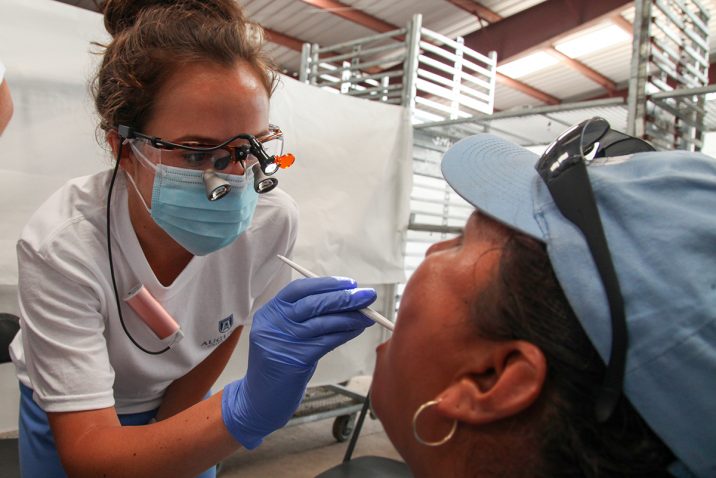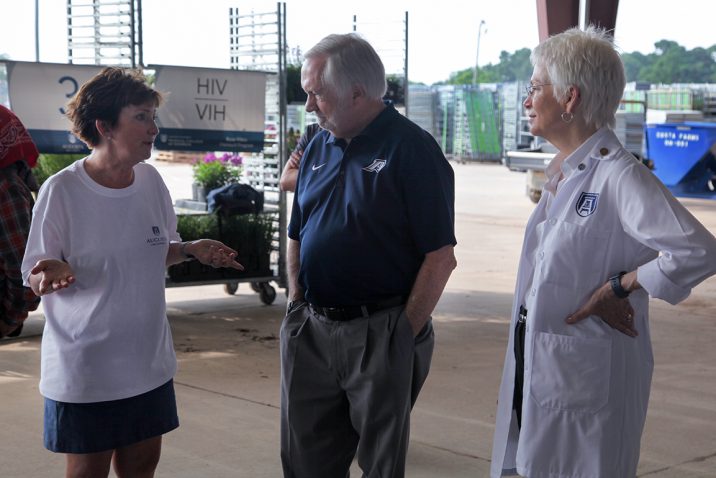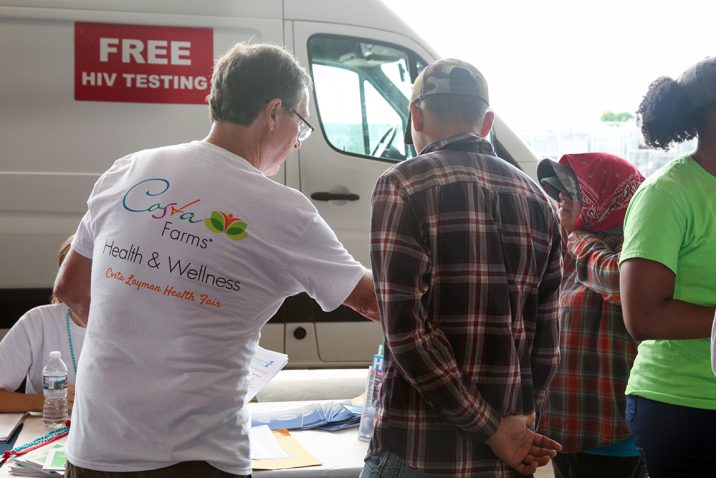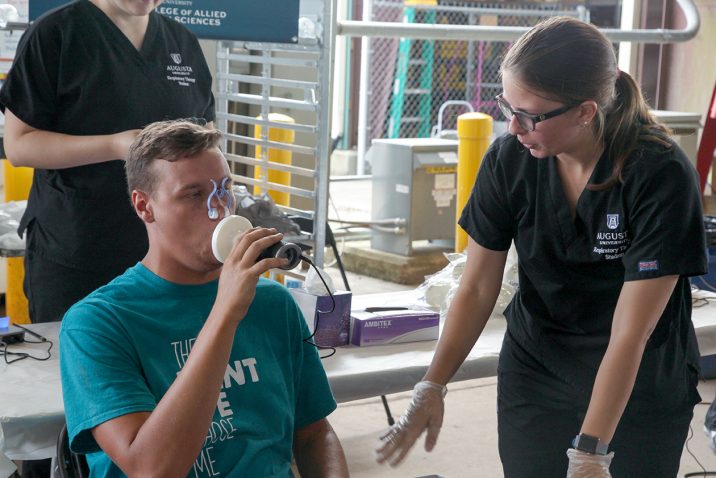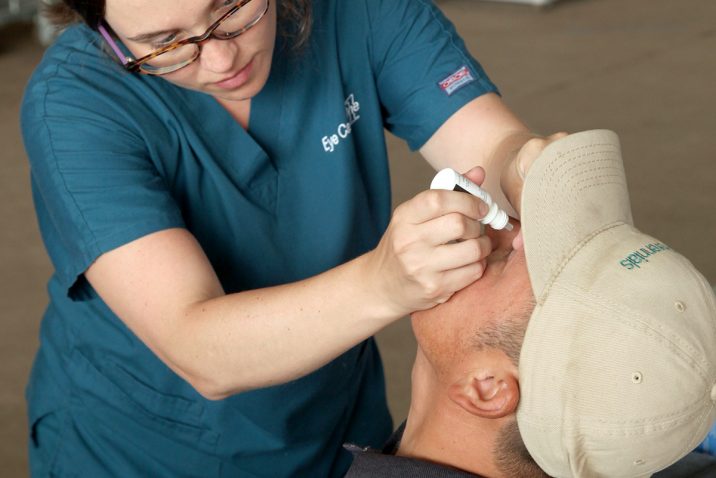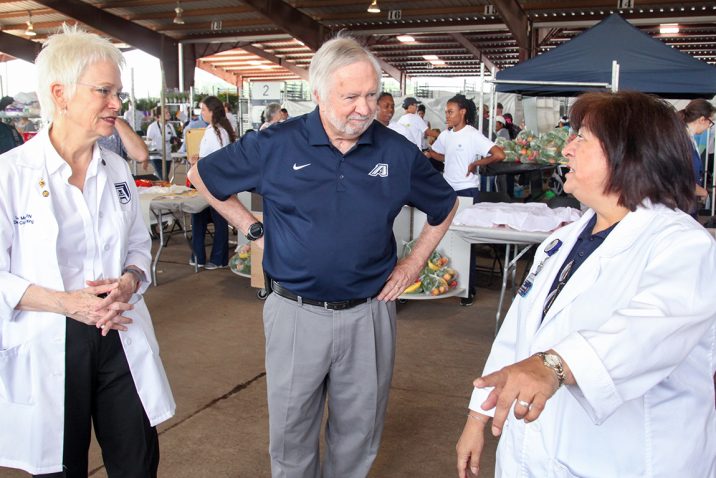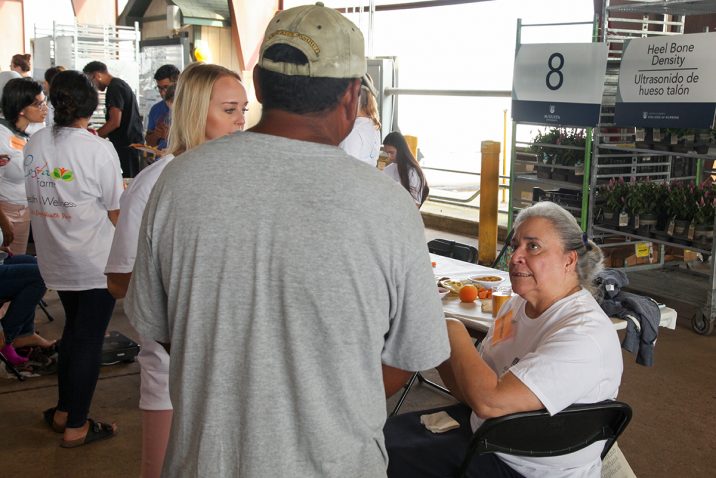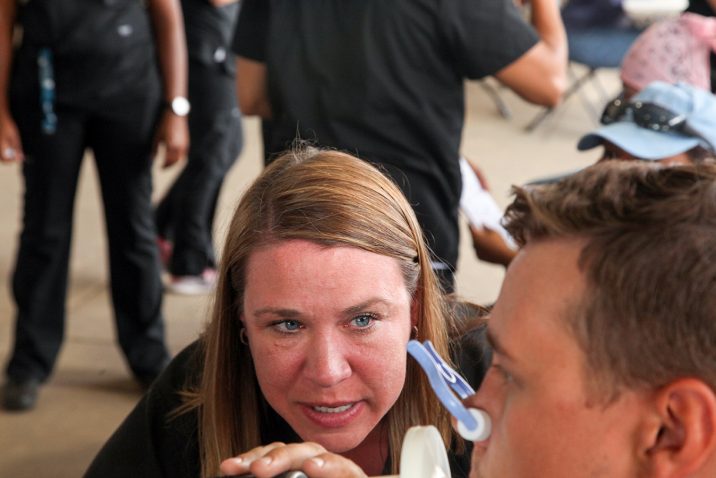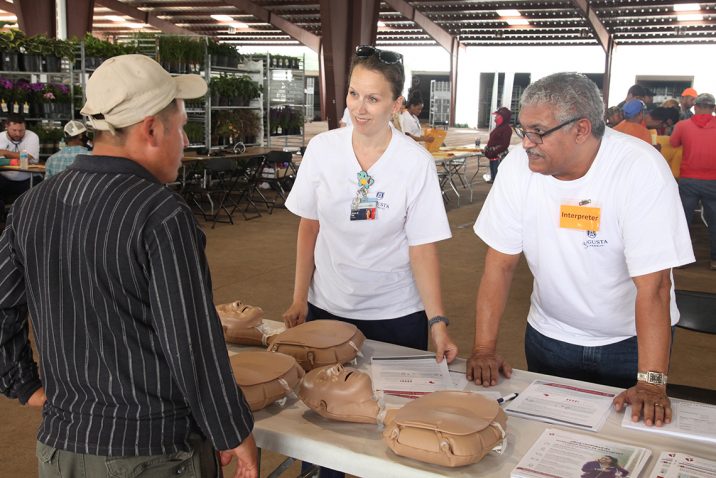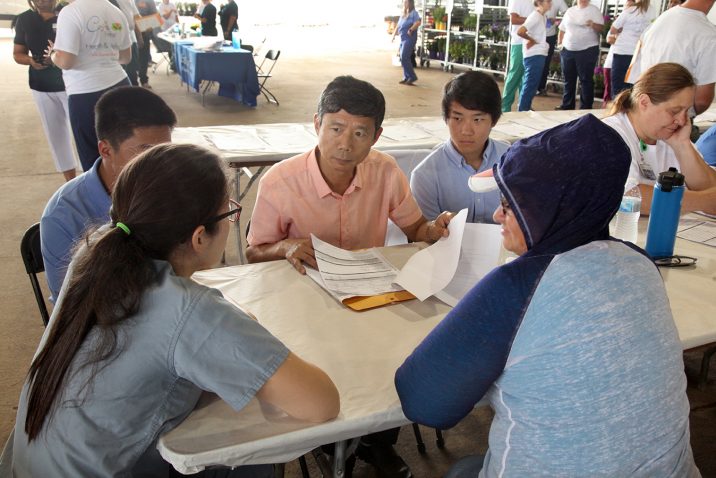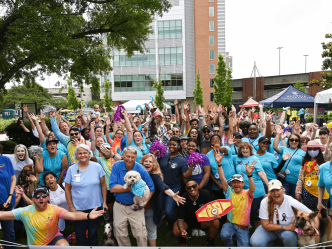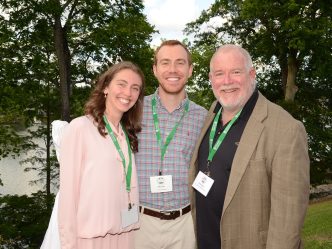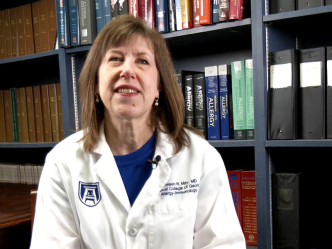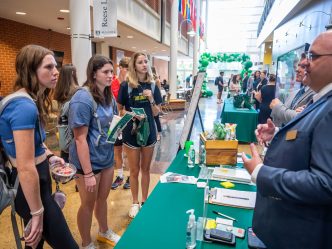There was a moment during the morning of the Costa Layman Health Fair when Dr. Pam Cromer and Debbie Layman looked around and took in what was happening around them. The health fair continues to grow with its partnership with Augusta University, and they are proud of what the annual event has become.
“It makes me want to be a student again so I can have the experience,” said Layman, a Medical College of Georgia School of Nursing alumna who has helped establish several scholarships. “The students are very fortunate to have an opportunity like this (health fair).
“They need all kinds of clinical experiences and it doesn’t need to be in a hospital or medical office environment,” Layman added. “They need to see the care given in any sort of setting, and with the hospital’s emphasis on rural health care, this is a prime example of how to provide health care in a rural setting.”
Screenings were supported by the university’s Medical College of Georgia. Also participating in the 14th annual event were students, faculty and alumni from the College of Nursing, the Dental College of Georgia, College of Allied Health Sciences, Institute of Public and Preventative Health, the Ryan White Program, the Center for Undergraduate Research and Scholarship and recruitment divisions.
The program has provided more than 5,000 screenings since its inception.
The migrant workers visited 10 stations during the June 28 health fair. They watched a video on hypertension while waiting to get their blood pressure checked. There was also a lab station, HIV testing, vision, dermatology and dental exams, heel bone density checks and respiratory and physical therapy.
“I’m very delighted that (the health fair) is as large as it is,” said Cromer, the director of Costa Layman Outreach Programs and professor of biobehavioral nursing. “This is one of the signature projects for the College of Nursing and it encompasses so many interdisciplinary people to be involved as well as the community support.”
Getting out of their comfort zone
While Cromer said the event was a win-win for the farm workers and the university, the experience has also helped build the character of the students working in a different environment.
“This opportunity allows them to see where they work and to get to know a little bit about (the workers’) life,” Cromer said. “We’re always teaching about patient-centered care. This allows them to use that concept and bring it to wherever they end up working.”
Assistant professor Nancy B. Young with the Dental College of Georgia has worked the health fair for more than seven years and says it has gotten bigger since the first year she participated in it. She said she was happy with some of the changes this year.
“We didn’t do probings because no one wants to have that done, so it became a little friendlier for the participants, she said. “We also did head and neck exams as well as oral cancer screenings, where we also look for decay and abscesses, oral pathology.”
Young said the majority of her students were seniors, but she did have some rising sophomores who were on break and cut into their vacation to work the health fair. The experience as a whole was positive, but Young thinks the students getting out of their comfort zones to work the event will go a long way as they further their careers.
“It broadens their education. I love this; this is one of my favorite (health fairs) that we do,” she said. “It’s great to get them out of their comfort zone. The nice thing is they own up to it and run with it. … It was fun to see some of the seniors pull those new sophomores in and teach them. They were teaching them what to look for and showing them stuff while they were examining patients. It was really good mentoring on their part.”
Layman, who used to own the Costa Layman Farm, praised Cromer’s ability to show the students how to work with what you’ve got.
“She has been able to teach her students how to set up a mobile MASH unit, on a loading dock, in Trenton, South Carolina,” Layman said. “It’s wonderful for the students to see you can give high-quality care no matter where you are. It doesn’t have to be a brand-new shiny clinic; it can be in the middle of a farm. There’s all sorts of ways to provide care. The main thing is to deliver high-quality care.”
Dr. Andrew Mazzoli of the College of Allied Health Sciences says their students get a multicultural blast all at once when they participate in this event.
“They may see one or two a year and then they get here and it’s an eye-opener,” he said. “They have to apply their craft to someone who is not an English-speaking person. This is a very different environment for them. They have to learn that talking louder doesn’t mean it’s going to help them understand.”
Volunteering while learning
Catherine Wallace de Melendez, who is in the Master of Science in Nursing – Clinical Nurse Leader program, spent most of Friday helping coordinate the close to 200 volunteers and making sure the stations had plenty of people working them.
While this was her first time participating at the health fair, she has done mission work and volunteered in health care settings before. She came away impressed with all the event has to offer.
“It’s a bigger and better endeavor for a single day. I think this is nice that this health fair is part of their work day,” she said. “It’s amazing to know that yesterday this area was for loading plants onto trucks until 5 o’clock and then until 7 this morning, they built exam rooms and stations.”
Victor Piedra, a third-year undergraduate kinesiology major, learned about the opportunity to volunteer through the Minority Association of Pre-Health Students (MAPS) and said he plans on helping out with the health fair again the future.
“One hundred percent, this was a very easy decision to make,” said Piedra, who was one of 38 interpreters on hand. “Especially after I heard they were helping migrant farmworkers, being that I am Hispanic, I felt attached to them and felt that I could definitely help them.”
Piedra, who is from Atlanta and a first-generation college student, said his parents are from Mexico and came here to live the American dream. He said they were migrant workers and felt volunteering was a good way of giving back.
He said his ability to speak Spanish put a lot of workers’ minds at ease.
“I think it definitely helps. A lot of people have been trying to get them to talk and most of them are shy. When I approached them and started talking to them in Spanish, you could tell there was a little bit of a sigh of relief in them,” Piedra said.
Success leads to growth
The event has taken place on different parts of the farm throughout its 14 years. This year, it took up almost half of a second loading dock, which is a stark contrast to its previous home, which was a building that was about 40 by 100 feet.
“Having a larger place to set up at has given us an opportunity to provide more services and more comprehensive services more comfortably,” Layman said. “We’re able to move around and we’re not elbow to elbow. We have room for privacy. We’re able to do more screenings at one time.”
Cromer said they’ve been in their current area for almost five years now. And the growth at the facility has helped with the growth of the event.
“Within the past year, they’ve doubled the size of (this loading dock). In doubling it, we’ve had an interest from our colleagues on campus, and they were able to fill this up as well. When it grows from the farm side, it also grows on the school side to not only meet the needs of our students but also meet the needs of the farmworkers.”
Layman said it’s important for her to give back not only to the university but also to the farm.
“The support and the resources that the university keeps putting into the event, and then the tweaking of all those resources to refine all the screenings — it’s fantastic,” she said. “They’re always looking for ways to tie in some of the university programs to this, such as industrial design and some of the business management courses, allowing them to put in a non-medical course with the health fair and let them solve real-world business problems.
“Many of these workers are workers that we hired in the 1990s, and they’re still here,” she said. “Because we had such a wonderful workforce, we were able to build a big business. Even though we don’t directly employ them anymore, I still feel very responsible to them and I want to take care of them by providing this opportunity because they depend on this for their yearly health care.”
Mazzoli has worked with the health fair for 11 years and says now they can do more testing and get faster results that not only benefit the patients, but also the students doing the research.
“The technology that we had then looked like a package of Twinkies. Today the technology looks like their phones. So they are touch-screening all of this, we can get it done faster, it holds more tests and the printouts are now all in color. It’s more toward this generation of users,” he said.
While he views the entirety of the event as a success for the students in that they’re able to help both their educations and the workers, his main hope is the event continues for years to come.
“It takes so much work to do this, but what people don’t realize is, is that it’s doable,” Mazzoli said. “When those of us decide to move on, my hope is that someone will pick up the gauntlet and have the same passion for it and keep it going. My hope is I make disciples of my students, that they will carry this tradition along.”
 Augusta University
Augusta University
